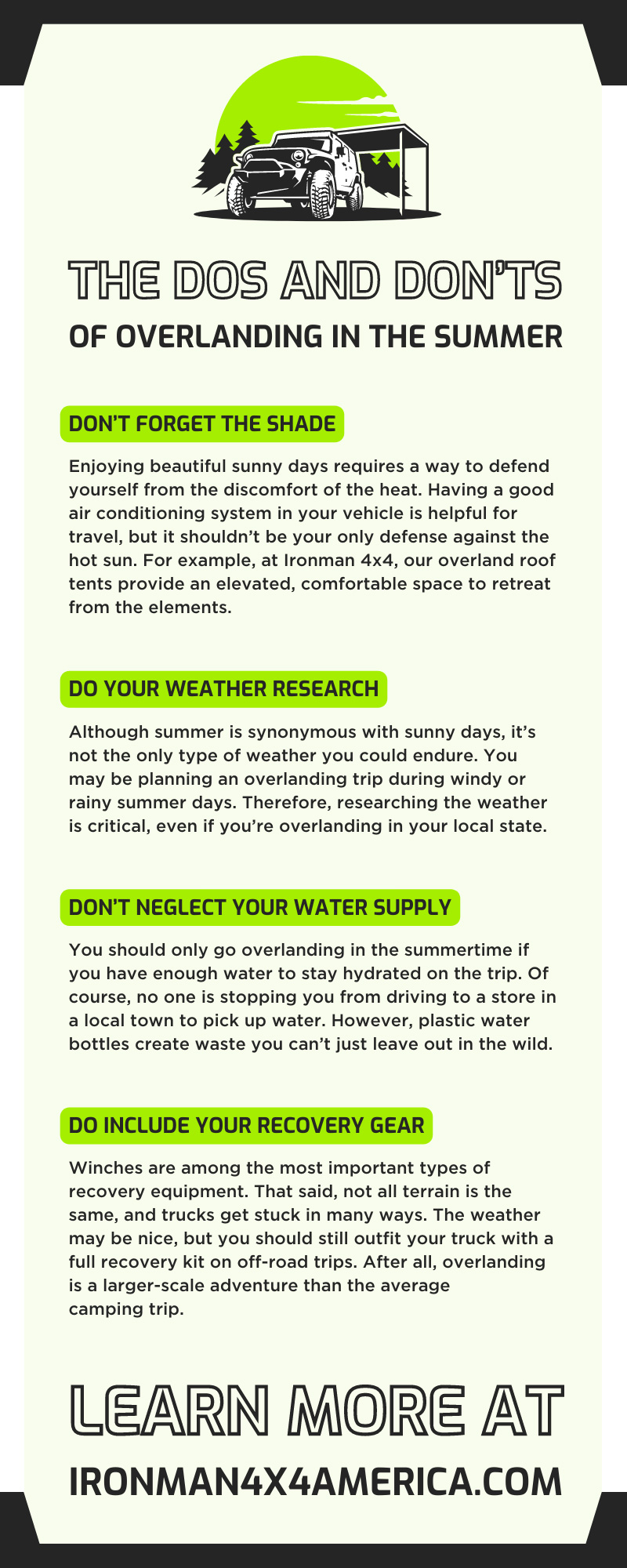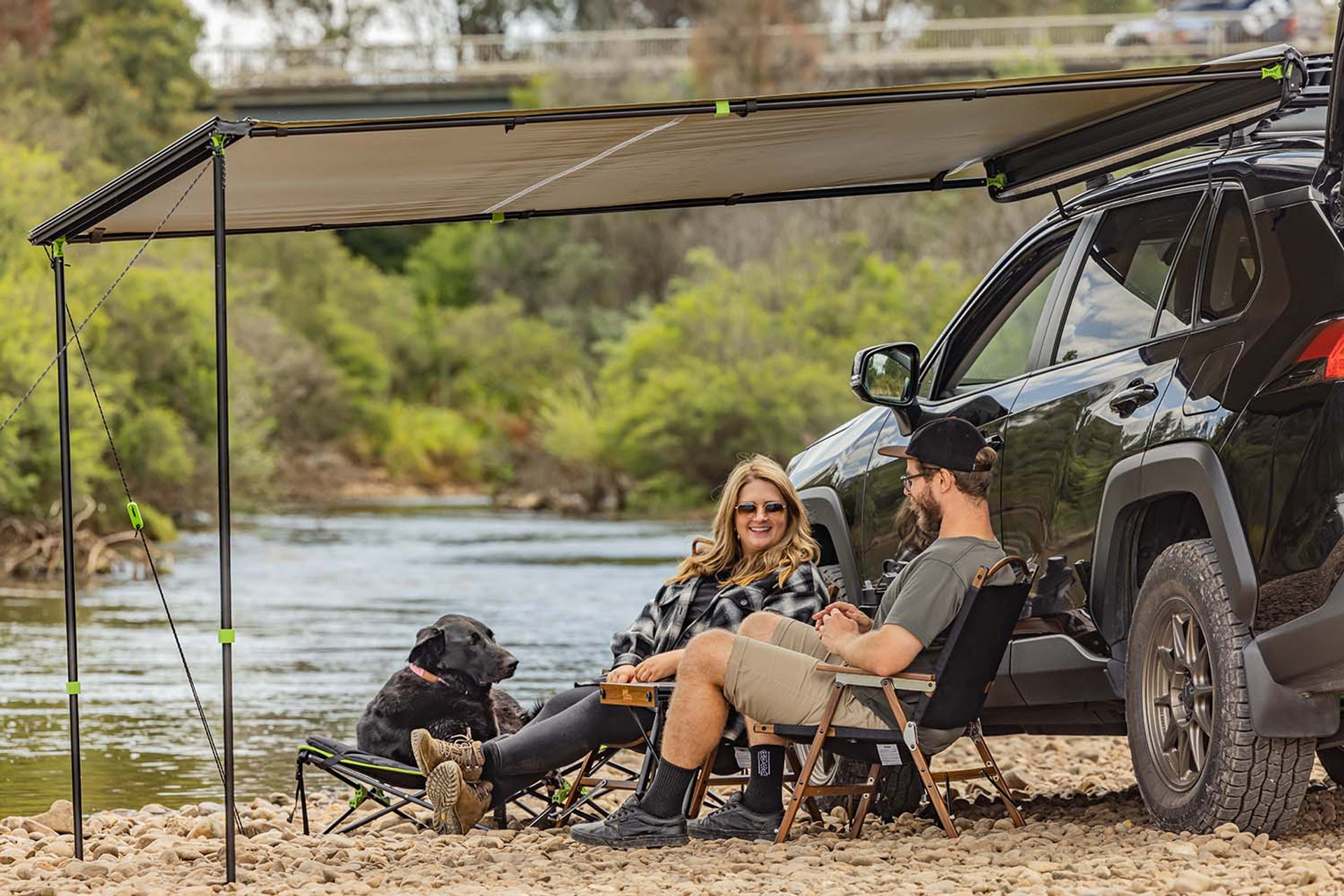The Dos and Don’ts of Overlanding in the Summer
You must prepare for many hazards when overlanding. The terrain is one hazard to prepare for, but the season is another critical detail. Fall, winter, spring, and summer all bring various off-roading conditions depending on where you travel.
Summer is a beautiful time to travel, but seasonal issues such as the heat can complicate things. Let’s explore the dos and don’ts of overlanding in the summer so you can take everyone on a satisfying escape outdoors.
Don’t Forget the Shade
Enjoying beautiful sunny days requires a way to defend yourself from the discomfort of the heat. Having a good air conditioning system in your vehicle is helpful for travel, but it shouldn’t be your only defense against the hot sun. For example, at Ironman 4x4, our overland roof tents provide an elevated, comfortable space to retreat from the elements.
We also carry additional types of shelter so you can create a more comprehensive camping setup. We have attachable awnings for trucks that provide shelter above so you can relax at the campsite without enduring the sun’s rays. We also have awnings with walls to provide more privacy during a warm evening.
Do Your Weather Research
Although summer is synonymous with sunny days, it’s not the only type of weather you could endure. You may be planning an overlanding trip during windy or rainy summer days. Therefore, researching the weather is critical, even if you’re overlanding in your local state.
Furthermore, if you’re going to a completely new state or country for the trip, it’s even more critical to get familiar with the expected weather conditions. That way, you can learn the specific hazards of the weather and terrain you’re visiting.
For example, rain can turn terrain such as rocks or mud into slippery hazards. This doesn’t mean you can’t go overlanding in the rain. You simply must know the hazards ahead so you can prevent them from making your trip dangerous. For instance, if your truck gets stuck in mud or other tricky terrains, a winch can provide you with a way to pull yourself out of trouble—literally. At Ironman 4x4, we carry electric off-road winches in various designs to suit each driver properly. For example, you can choose between synthetic rope or steel cable for the winch design. Considering the finer details like these ensures you can find a winch system best suited for your needs.
Don’t Neglect Your Water Supply
You should only go overlanding in the summertime if you have enough water to stay hydrated on the trip. Of course, no one is stopping you from driving to a store in a local town to pick up water. However, plastic water bottles create waste you can’t just leave out in the wild. Likewise, overlanding typically takes travelers on trips through nature, and not always somewhere with a nearby shop for water and amenities.
You should have a self-sufficient setup on the go, and you can do that with well-stocked water tanks. At Ironman 4x4, our off-road gear includes water tanks that range from bulky to slim to ensure you can make them fit in your cargo how you want. You can use our 13-gallon roof rack water tank for easy storage on top of your vehicle. In addition, we have bulkier water tanks that can hold more water and reside in your truck, ready for you to use. Lastly, bringing reusable water bottles to refill ensures you can truly leave no trace on your trip.
Do Include Your Recovery Gear
As we mentioned above, winches are among the most important types of recovery equipment. That said, not all terrain is the same, and trucks get stuck in many ways. The weather may be nice, but you should still outfit your truck with a full recovery kit on off-road trips. After all, overlanding is a larger-scale adventure than the average camping trip. The more adventurous off-road driving you do, the more important it is to have a solution for accidents.
At Ironman 4x4, our recovery kits and accessories include tire repair equipment, compact shovels, and recovery boards. Simply put, the kit provides you with many tools to help you get your truck back to the campsite if a problem occurs.
Don’t Camp or Hike With Heavy, Unorganized Cargo
The heat makes summer camping challenging, but water and shade aren’t the only ways to combat the heat while enjoying the sun. On an overlanding trip, you will have more cargo than on a short camping trip. Therefore, it’s important to organize quality storage at your campsite and in your truck when overlanding. Also, you should keep your cargo lightweight if you go hiking at any of your stops during the trip.
Bringing convenient campsite storage ensures you don’t have to restrict your packing to only loose boxes and backpacks. There’s nothing wrong with bringing just a backpack, but you should provide yourself with more ways to carry food, water, toiletries, first aid supplies, and other items. For instance, our storage options at Ironman 4x4 go beyond the aforementioned water tanks. Our gear for off-road travel also includes rugged storage containers for larger-scale items. However, we also have high-quality drawers for trucks so you can easily keep smaller items safe and secure on the go.
Likewise, packing lightweight cargo for hikes ensures you have your essentials—such as water and first aid supplies—without carrying ample extra weight. That extra weight can make hot summer days even more uncomfortable and sweaty. Luckily, all it takes is careful planning and good storage to make those hot days more manageable.
Do Strategize Your Meals Carefully
On top of hydration, you also need necessary vitamins and nutrients to ensure a healthy overlanding trip. Packing trail mix for a hike is fine, but that’s not a diet that will sustain you for a full overlanding trip. Thankfully, you can easily prepare full, nutritious meals for overlanding adventures. Our cooking equipment at Ironman 4x4 includes outdoor equipment such as thermal drink bottles, mugs, fridges, freezers, fire pits, and ovens. We also carry collapsible containers for food and dish storage.
This array of equipment ensures that overlanders can have a satisfying, comfortable experience when eating meals on off-road terrain. For example, you can prepare meals at home and store them in the freezer for when you want to reheat them. You can also fill the fridge with ingredients and have a full cooking experience outdoors. The right choice comes down to what you feel is best for the trip you’re currently planning.
Use these dos and don’ts of overlanding in the summer to make the big trip safe and worth taking! And remember that Ironman 4x4 has your back with all the overlanding supplies you could need.


